Islamic State Strives Without End
Unembedded Middle East reporter Patrick Cockburn describes the political and economic facts that enable Isis to continue its sweep through Iraq and Syria, and explains why a defeat for the group in the Syrian city of Kobani would not be the beginning of its end.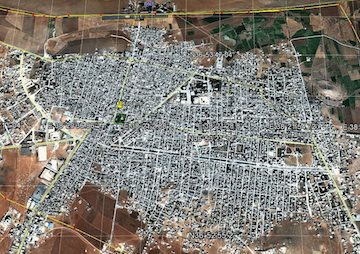 A Google Earth view of the northern Syrian city of Kobani. Photo by quapan (CC BY 2.0)
A Google Earth view of the northern Syrian city of Kobani. Photo by quapan (CC BY 2.0)
Unembedded Middle East reporter Patrick Cockburn describes the political and economic facts that enable Isis to continue its sweep through Iraq and Syria, and explains why a defeat for the group in the Syrian city of Kobani would not be the beginning of its end.
Cockburn writes at The Unz Review:
Over the summer Isis – the Islamic State of Iraq and Syria – defeated the Iraqi army, the Syrian army, the Syrian rebels and the Iraqi Kurdish peshmerga; it established a state stretching from Baghdad to Aleppo and from Syria’s northern border to the deserts of Iraq in the south. Ethnic and religious groups of which the world had barely heard – including the Yazidis of Sinjar and the Chaldean Christians of Mosul – became victims of Isis cruelty and sectarian bigotry. In September, Isis turned its attention to the two and a half million Syrian Kurds who had gained de facto autonomy in three cantons just south of the Turkish border. One of these cantons, centred on the town of Kobani, became the target of a determined assault. By 6 October, Isis fighters had fought their way into the centre of the town. Recep Tayyip Erdogan predicted that its fall was imminent; John Kerry spoke of the ‘tragedy’ of Kobani, but claimed – implausibly – that its capture wouldn’t be of great significance. A well-known Kurdish fighter, Arin Mirkan, blew herself up as the Isis fighters advanced: it looked like a sign of despair and impending defeat.
In attacking Kobani, the Isis leadership wanted to prove that it could still defeat its enemies despite the US airstrikes against it, which began in Iraq on 8 August and were extended to Syria on 23 September. As they poured into Kobani Isis fighters chanted: ‘The Islamic State remains, the Islamic State expands.’ In the past, Isis has chosen – a tactical decision – to abandon battles it didn’t think it was going to win. But the five-week battle for Kobani had gone on too long and been too well publicised for its militants to withdraw without loss of prestige. The appeal of the Islamic State to Sunnis in Syria, Iraq and across the world derives from a sense that its victories are God-given and inevitable, so any failure damages its claim to divine support.
But the inevitable Isis victory at Kobani didn’t happen.
… The replacement of Nouri al-Maliki’s corrupt and dysfunctional government by Haider al-Abadi hasn’t made as much difference as its foreign backers would like. Because the army is performing no better than before, the main fighting forces facing Isis are the Shia militias. Highly sectarian and often criminalised, they are fighting hard around Baghdad to drive back Isis and cleanse mixed areas of the Sunni population. Sunnis are often picked up at checkpoints, held for ransoms of tens of thousands of dollars and usually murdered even when the money is paid. Amnesty International says that the militias, including the Badr Brigade and Asaib Ahl al Haq, operate with total immunity; it has accused the Shia-dominated government of ‘sanctioning war crimes’. With the Iraqi government and the US paying out big sums of money to businessmen, tribal leaders and anybody else who says they will fight Isis, local warlords are on the rise again: between twenty and thirty new militias have been created since June. This means that Iraqi Sunnis have no choice but to stick with Isis. The only alternative is the return of ferocious Shia militiamen who suspect all Sunnis of supporting the Islamic State. Having barely recovered from the last war, Iraq is being wrecked by a new one. Whatever happens at Kobani, Isis is not going to implode. Foreign intervention will only increase the level of violence and the Sunni-Shia civil war will gather force, with no end in sight.
Dig into the particulars of Cockburn’s report here.
— Posted by Alexander Reed Kelly.
Your support matters…Independent journalism is under threat and overshadowed by heavily funded mainstream media.
You can help level the playing field. Become a member.
Your tax-deductible contribution keeps us digging beneath the headlines to give you thought-provoking, investigative reporting and analysis that unearths what's really happening- without compromise.
Give today to support our courageous, independent journalists.
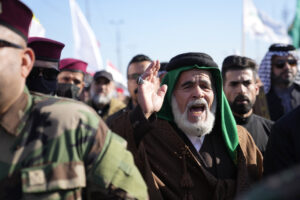
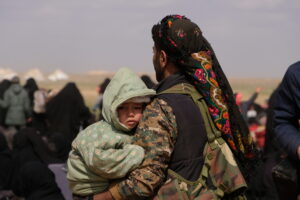
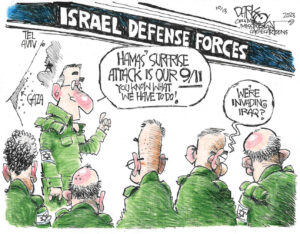

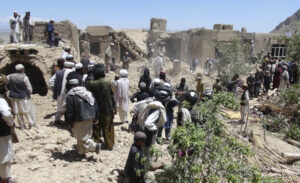
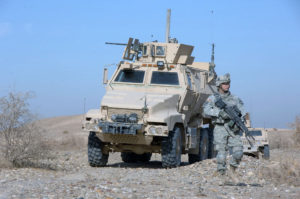
You need to be a supporter to comment.
There are currently no responses to this article.
Be the first to respond.